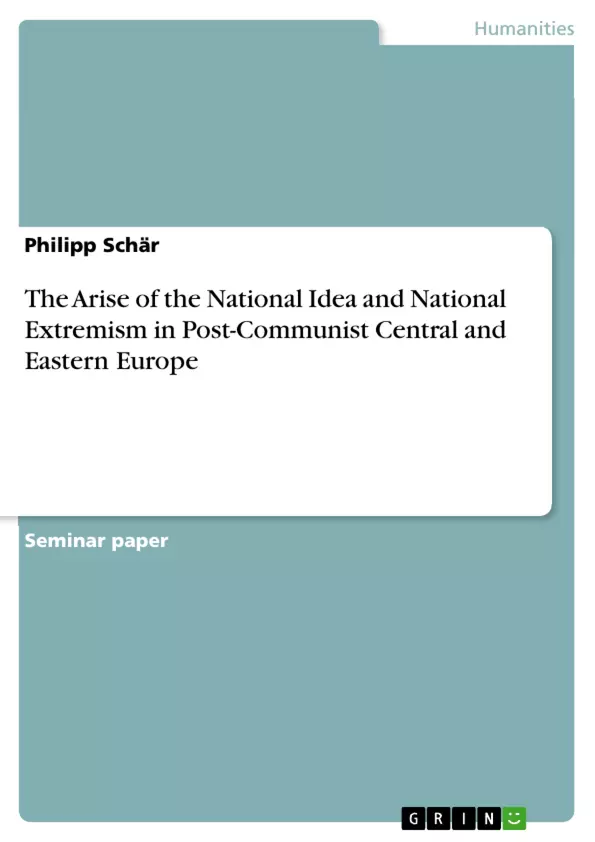The national idea has played a very powerful role in the regime, state and economic transitions in post-communist Eurasia. The important role of national identity can have positive effects as well as negative ones - for example in case of the Racist Extremism. Nationalism is able to play a powerful role to create movements of extremism, and this role differs in its importance between the different countries of Eastern Europe as well as between countries of Eastern Europe compared to other countries. In my Essay, I will first try to explain where the nationalism in Central and Eastern Europe after the communist era comes from. Afterwards, I will concentrate in those negative effects which I mentioned. I will compare the racist extremism and finally I will compare the situation there to the situation in Western countries. I will try to find reasons for the existing situation, although I know that a respectable analysis would clearly exceed the size of this short essay.
Inhaltsverzeichnis (Table of Contents)
- Introduction
- Post-Soviet Nationalism in Central and Eastern Europe
- Racism in Central and Eastern Europe
- Politic Parties
- Subculture
- Conclusion
Zielsetzung und Themenschwerpunkte (Objectives and Key Themes)
This essay explores the emergence and impact of nationalism in post-communist Central and Eastern Europe. It aims to analyze the roots of this phenomenon, specifically its manifestation in racist extremism, and compare the situation in Eastern Europe to Western countries.
- The rise of nationalism after the collapse of communism
- The role of ethnicity, language, and religion in constructing national identity
- The impact of imperial legacies on national identity and state formation
- The prevalence and impact of racist extremism in Central and Eastern Europe
- A comparative analysis of racist extremism in Eastern and Western countries
Zusammenfassung der Kapitel (Chapter Summaries)
The introduction lays out the central argument of the essay: nationalism played a significant role in the transition from communism to capitalism in Central and Eastern Europe, both positively and negatively. The essay focuses on the negative consequences of this phenomenon, particularly the rise of racist extremism.
Chapter 2 explores the emergence of post-Soviet nationalism. The collapse of communism, the author argues, led to a resurgence of national identity, which was often rooted in ethnic, linguistic, and religious commonalities. This process was influenced by the legacies of imperial domination and the desire to construct new national states.
Chapter 3 examines the prevalence of racist extremism in Central and Eastern Europe. The chapter discusses the involvement of racist extremist groups in the broader anti-communist movement, the emergence of dedicated racist parties, and their varying degrees of success in different countries.
Schlüsselwörter (Keywords)
The main keywords and focus topics of this essay are: post-communist transition, nationalism, ethnic identity, racism, extremism, Central and Eastern Europe, Western Europe, state formation, imperial legacies.
Frequently Asked Questions
Why did nationalism rise in Central and Eastern Europe after communism?
The collapse of the communist regime led to a resurgence of national identity as people sought new foundations for statehood, often rooted in ethnic, linguistic, and religious commonalities.
What is the "national idea" in the context of post-communist transitions?
The national idea refers to the use of national identity to drive political, economic, and social transitions, which can have both positive nation-building effects and negative extremist consequences.
What are the negative effects of this nationalism mentioned in the essay?
The essay specifically focuses on racist extremism and the emergence of movements that use nationalism to promote exclusion and violence.
How does racist extremism manifest in these countries?
It manifests through the formation of specific political parties and extremist subcultures that gained traction during the transition period.
Is the situation in Eastern Europe different from Western countries?
The essay compares extremist movements in the East and West, analyzing how different historical backgrounds and imperial legacies influence the nature of extremism.
What role did imperial legacies play in constructing national identity?
Imperial legacies often left a vacuum or a sense of suppressed identity that fueled a more intense and sometimes radical drive for national self-determination after 1989.
- Citar trabajo
- Philipp Schär (Autor), 2006, The Arise of the National Idea and National Extremism in Post-Communist Central and Eastern Europe, Múnich, GRIN Verlag, https://www.grin.com/document/67811



